Twelve writers sat in a circle on couches or chairs, under dim lighting. They chatted about classes, favorite authors, weird things they wrote or wanted to write. Student Writers Association’s Jan. 27 meeting resembled a coffee shop more than a classroom. “The quiet, comfortable atmosphere is what makes this group so successful,” said Creative Writing major Amaya Hoke. She noted that part of the growing success of the often ramshackle organization was the switch from a boring Benildus classroom to the O’Shaughnessy Performance Space. Senior Brandon Brown has attended every SWA meeting, seeing his role as more of an advisor than a president. “This is about building a foundation,” he said when asked about the group’s goals. Of the 12 in attendance, most were underclassmen, a demographic that is key to establishing the group’s future. The laid-back vibe of the meeting is deliberate. Brown saw that establishing a connection with other writers, who are usually a solitary lot, is just as important as any craft exercise. “You can make friends. You’ll see someone walking in the hallways and say, ‘Hey, I know that person, because I hang out with them for two hours every Tuesday night,” he said. “I feel like it works. [The meetings are] always easy, it never feels like a chore.” Missing the intellectual stimulation, recent graduate Curtis Mueller started attending meetings last November. “We’re really spoiled here,” he said. “Here, people are talking about things they actually want to do. Out in the real world they just want to talk about stupid bullshit.” Though the group is informal, Hoke organizes a writing exercise every meeting meant to remove the writers from their comfort zone. Some are structurally complicated, like a three paragraph flash piece that changes genres each paragraph. Others...
Leticia Gonzales’ Senior Show
posted by Nick Martinez
Leticia Gonzales hasn’t always known her niche. “The first thing I wanted to do was dance,” she said. “Then sing. Then I wanted to join a Mariachi group and wanted to play trumpet, but I couldn’t play trumpet. Then I wanted to play bass, but I couldn’t play bass. So it was guitar or violin, and guitar is fucking stupid.” Tonight at 7 p.m., Gonzales will be performing her senior show featuring nine musical selections from various nations ranging from America to Macedonia, Ireland to Guinea. She will showcase her talents on vocals, violin and three African drums (Dununba, Sangban and Kenkeni). But organizing the event, and performing in front of a crowd was the last thing she wanted to do. Gonzales grew up listening to American Folk music, and when she enrolled at University of New Mexico, music seemed to be the natural choice. But its program was too confined for her musical curiosity. Faith renewed when she transferred to SFUAD and discovered its Balkan and African drum ensembles. “The only way I can talk about why [I like Balkan and African music] is that I heard it and it spoke to me,” she said and that seems to be a running theme. Along with being a music major, Gonzales is also working toward a minor in writing, something she considers her true passion. “Writing would be the vessel,” she said. “ And inside of that is music, textiles, philosophy, language and everything else that makes me excited about living.” Caitlin Brothers, Gonzales’ friend and musical partner, sees her experience as a writer seeping into her senior show in the arrangement of music, and spoken word selections. “I feel like she’s organized the show almost how one would arrange a poem,” she said. “It feels like being a part of a nine point poem.” Brothers and Gonzales perform with each other often, including as part of their band Storming The Beaches With Logos In Hand. They also share the connection of both being women in a predominantly male department. “Having a conversation without being listened to, is bearable sometimes,” said Brothers. “Trying to play music with someone who isn’t listening to you—you can’t fucking do anything, We found each other as people who can listen to one another. She knows I’ll listen to her, and I know she’ll listen to me.” In part to Gonzales’ distaste for singing publicly, and the duo’s musical compatibility, Gonzales acknowledges that her show would be lost without Brothers’ contribution on percussions and vocals. “When I was considering African rhythms and singing the tunes that I’m singing, the only way that I thought that would come to fruition was if I imagined Caitlin doing them with me,” said Gonzales. She is self-deprecating, nervous about applying make-up for the camera, but it is clear with her attention to detail in writing, and dedication in learning new music, that Gonzales knows what she is doing. “I’m hoping that in presenting things in a methodic and tight woven way, there will be an hour where everybody in the same room is connecting in the same way, on a winter night,” she said. Along with Gonzales and Brothers, the show also features collaborative composition between Gonzales and Sam Armstrong Zickefoose, as well as Bailey Schaumburg reading a selection from Italo Calvino’s “Invisible Cities.” Gonzales requests that there be no cell phones or photography, and that you hold all applause until the end. Leticia Gonzales Senior Show O’Shaughnessy Performance Space 7 p.m. Free...
Music Unites!
posted by Luke Henley
The campus of St. John’s College may seem tucked away in isolation in one of the hillier parts of Santa Fe, but with the recent opening of a student-run coffee shop and concert venue, the distance between its student body and SFUAD’s may begin to feel a bit shorter. Dubbed “The Cave,” calling to mind Plato’s famous allegory, a space has been established by St. John’s students for their schoolmates to congregate and caffeinate. In addition, the coffee shop plays the role of both an art gallery and concert venue thanks to students’ visions. In a phone interview with Theo Krantz, a junior at the school and sole booking contact for musicians and other performers, he shared his thoughts on the possibilities The Cave holds for better integrating St. John’s and SFUAD students. Krantz himself has experienced this integration of artistic communities by playing a show in SFUAD’s O’Shaughnessy Performance Space with his band High Diver. He said, “I do love the Benildus Hall space,” later adding that the experience made him feel that getting St. John’s students to attend more SFUAD events, and vice versa, would be good for both student bodies. “I would love to have the two communities be much more entwined than they are,” Krantz said. The first event held at The Cave seemed to reflect that as several SFUAD students attended and played the concert (including the author of this article’s band Sex Headaches). The show lineup also included Thieves & Gypsies – whose lineup includes CMP alum Adam Cook – and CatNip Tea. Krantz said he was enthusiastic about the event and felt positive about the interactions between both groups of students, saying he felt the SFUAD attendees were “really respectful and nice.” When asked why he felt...
The Poet’s Guide to Journalism
posted by Jonathan Hargraves
On Oct. 14, Tom Sleigh, a noted poet, read excerpts from his most recent collection of poems — “Station Zed” — to a crowded O’Shaughnessy Performance Space at Santa Fe University of Art and Design. The collection is part of a new body of work by Sleigh inspired by his recent travels to the Middle East. In addition to the poems, Sleigh journalized the experience in an essay titled “The Deeds” in which Sleigh casts himself as a poet in journalist’s clothing, seeking passage to the Lebanese city of Qana in order to learn the Palestinian side of the 2006 Israeli-Palestinian conflict. “I loved doing it,” Sleigh says, “I didn’t think about myself…all doubts immediately vanished… [and] there was no detail too small that wasn’t suddenly charged with interest.” “The Deeds” was published in the Virginia Quarterly Review in 2008, and selected for inclusion in the 2009 edition of the “Best American Travel Writing” compendium. However, before this acclaim Sleigh says he had no desire to go to Lebanon — adding, as a joke, that he barely knew where to find it on a globe. “What I didn’t know about Lebanon could fill many books.” In 2007, Munir Akash invited Sleigh to Lebanon. Akash is the founder of the Trans-Arab Unity Foundation, and Sleigh’s invite was part of an initiative by the group to bring artists and writers to the Middle East. Sleigh says Akash wanted him to assess and write about the conditions of Palestinian refugees, “particularly in the aftermath of the 2006 war.” Originally, the trip was postponed for three months, Sleigh says, because of backlash from the murder of “a very prominent Christian Maronite politician” — Plerre Gemayel. According to the trans-Arab news network Al-Jazeera, the cabinet minister was gunned down in his car during a traffic jam in a Christian neighborhood — almost immediately his death was followed with “angry protests” by his supporters. Though unsettling for Sleigh, an assassination turned out to be the least of his worries. “As soon as we landed,” he says, “a huge car bomb went off.” In Lebanon, Sleigh says car bombs are so frequent that while watching Abbott and Costello’s “Meet the Mummy” in a Beirut hotel room, he saw commercials for personal bomb-detecting devices — an experience upon which he elaborates in “The Deeds.” During his visit, the violence only escalated. Sleigh says he experienced some of the worst internal violence since the 15 years of civil war that took place in Lebanon between 1975 and 1990. “People were being blown up all the time…and I was scared.” In spite of his fear, or maybe as a result of it, Sleigh became “acutely aware” of the world around him, and was “totally interested in what everybody was wearing, what they were thinking [and] what they were saying.” The experience, at times, was even “exhilarating.” Because most of the fighting in 2006 had occurred in the southern part of Lebanon, Sleigh says he decided to go there to see what, if anything, had been preserved. “But did I know what the hell I was doing?” Sleigh asks, adding, “no.” Never before had Sleigh attempted journalism. Sleigh met Chris Merrill — another poet whom he describes as an “old-school journalist who covered the Bosnian war.” Merrill showed Sleigh the journalistic ropes, and through technical mimesis Sleigh acquired the information-gathering skills that would be required of him to complete “The Deeds.” “It was monkey see, monkey do,” he says, but “poetry taught me how to compress information, and to describe accurately what I see.” In gathering information for his essay, Sleigh says he “did lots of interviews,” and not once throughout the process did he use a tape recorder, which he believes acts as a barrier between the journalist and the subject when the two are attempting to establish trust. Also, a subject — in the absence of a tape...
Sunday Night Sound
posted by Luke Henley
“This is a really great way to put off your homework for Monday,” said Greg Bortnichak as he poised his fingers across the fretboard of his cello. Bortnichak makes up one half of Teach Me Equals along with Erin Murphy, a duo from Florida that brought their blend of classical instrumentation and modern experimental rock flourishes to the O’Shaughnessy Performance Space last Sunday, Oct. 5. Bortnichak’s quip hit home for most of the gathered crowd of students as laughter brought in the next song of squelching electronic loops and the roar of the band’s hypnotic, distorted tones. Before his set, Bortnichak spoke enthusiastically about SFUAD’s music program facilities, claiming amazement at the students’ easy access to performance and practice spaces, as well as recording facilities. Testament to this point is the ability for students to put on shows on a Sunday night, and several students took advantage of that luxury. The space filled up quickly as openers Venus and the Lion took the stage, and it was quickly apparent that these students were there to move to the music, not simply stand as idle observers. After releasing its debut EP Absinthe last February, the SFUAD-student band Venus and the Lion have been working on new material. These songs expand on a foundation of groovy, classic rock-tinged sound established on its freshman effort. These elements have been expanded into longer, more complex arrangements that still manage not to stray from the band’s ability to tap into a crowd’s lust for dance-ready rhythms. The audience was along for the band’s ride, taking in newer material with vocal enthusiasm, although there was a noticeable spike in cheers as the band tore into its best-known single “T. Rex,” whose bluesy stomp threw the crowd into a sudden blissed-out...

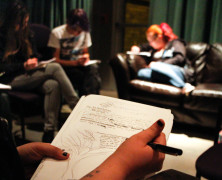
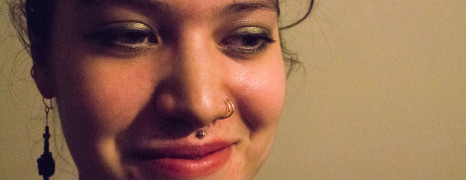
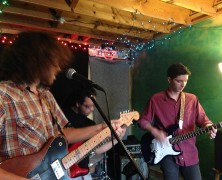
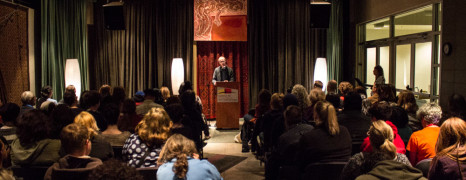
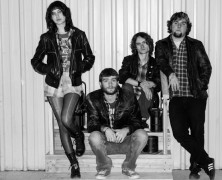
 Jackalope Magazine is the student magazine of Santa Fe University of Art and Design. Building on the interdisciplinary nature of our education, we aim to showcase the talent of our university and character of our city.
Jackalope Magazine is the student magazine of Santa Fe University of Art and Design. Building on the interdisciplinary nature of our education, we aim to showcase the talent of our university and character of our city.
Recent Comments